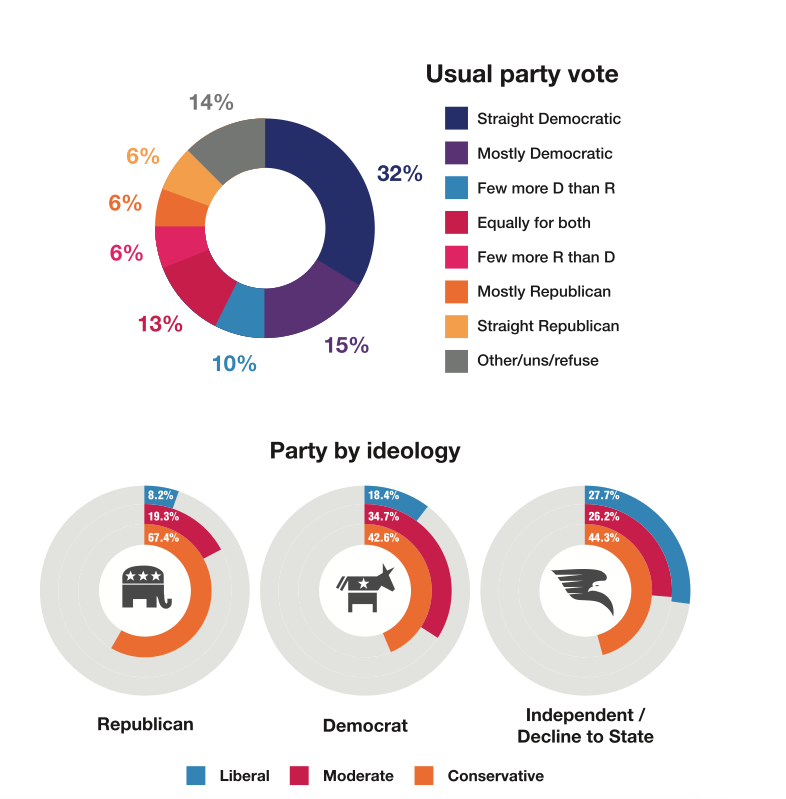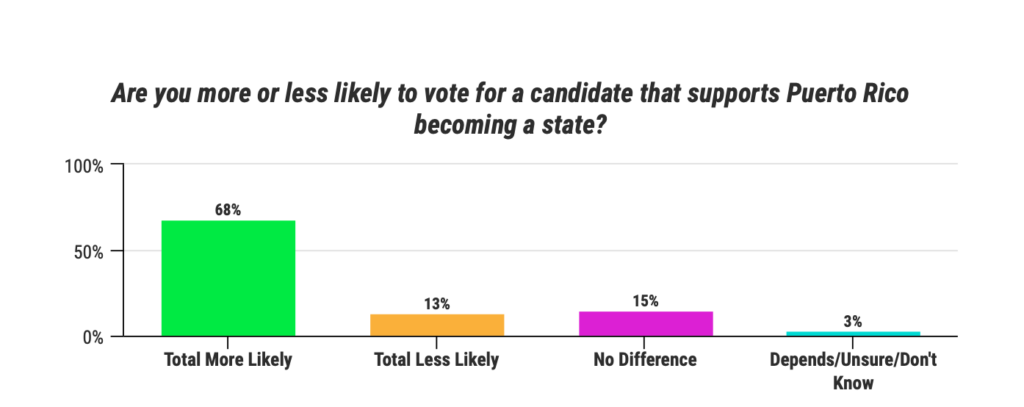In a new survey of 1,000 Puerto Rican voters across the country, we learned a lot of new information. Some of the things we learned were not surprising. For example, we found that the majority of respondents preferred statehood over other status options. This is no surprise; poll after poll on the Island and on the mainland have shown that statehood is the majority position. But some were surprised to find that about half the respondents were Republicans.
Interviewers asked first whether the people they were interviewing were registered to vote. This was to confirm the information they already had. The targets of the survey were chosen with data from L2, an organization that makes it possible to hone in on a group like Puerto Rican voters.
Having made sure that all the subjects were registered voters, the interviewers asked, “Are you currently registered as a Republican, Democrat, Independent, or something else?” The various options were presented in rotating order, so no option was always the first choice.
48% of respondents were Republicans. 31% described themselves as Democrats and 17% were Independent.
A change?
We have been saying for years that Puerto Rico wouldn’t be a shoo-in for Democrats. Many people, including Republican leaders in Congress, claim that making Puerto Rico a state would guarantee two more Democratic senators. This is not a good argument against statehood; choosing not to allow citizens to vote because you fear they may vote against you is not the American way. But it’s also inaccurate.
Still, there is a very widespread belief that Puerto Ricans will be most likely to vote Democratic when they have the chance to vote for the national parties. So does this survey signal a change? We don’t think so.
Look back at the last survey we sponsored.
In 2014, 400 Puerto Rican voters in Florida were asked about their views on political and social issues. Florida is a swing state, and about half of the respondents in that survey said they voted Democratic more often than Republican. 13% voted equally for both parties and only 6% voted a straight Republican ticket.
However, the majority defined themselves as conservative, no matter which party they identified with most strongly.
Location, location, location
Florida has the largest Puerto Rican population on the U.S. mainland. New York, which until recently had the largest Puerto Rican population, still has the second largest.
These two states have been the source of many of our ideas about Puerto Rican voters. This is particularly true of New York, which had the largest Puerto Rican population in the states for half a century. New York is a determinedly blue state. It should not surprise anyone that the majority of Puerto Ricans in New York, like the majority of the rest of the population in New York, are Democrats.
The new survey was much more inclusive. Subjects were chosen simply because they were Puerto Rican and lived in a state. The states included blue states like New York, swing states like Florida, and also red states like Texas. Florida, New York, Pennsylvania, Texas, Ohio, and Georgia were the states in which surveys were conducted. Of those states, only New York is rated solidly for one party or the other by Five Thirty Eight.
A surprising result
While we know that people are reacting to this difference from their expectations with surprise and even disbelief, we think this is a more accurate picture of Puerto Rican voters. Within our own organization, we have both Republicans and Democrats. The “statehood party” in Puerto Rico includes both Republicans like Resident Commissioner Jenniffer Gonzalez-Colon and Democrats like Governor Pedro Pierluisi.
Hawaii and Alaska were admitted as states together n 1959. Hawaii was expected to be a red state. It is actually one of the most solidly blue states. Alaska was expected to be a blue state, but it is in fact a red state. We have been saying for years that Puerto Rico, where politics does not center on the two national parties, is likely to be a swing state.
Both parties have the opportunity to reach out to voters in the new state of Puerto Rico, and either might be able to sway more voters. One thing is sure: if one party is more helpful than the other in gaining equality for Puerto Rico through statehood, the voters in Puerto Rico will remember that.









No responses yet